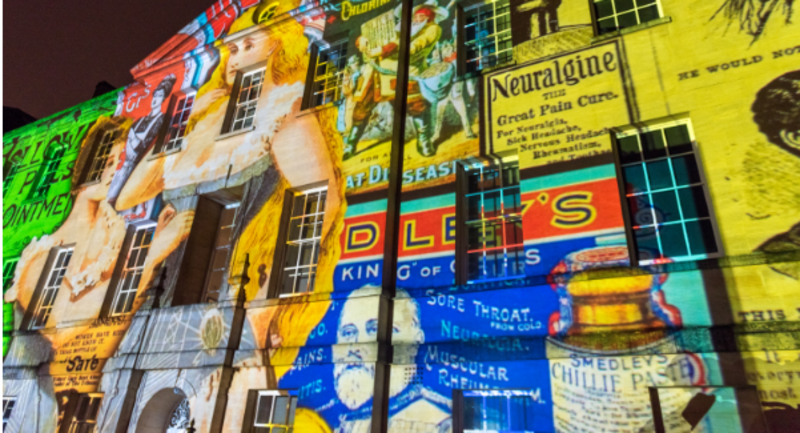Impact Case Study: Diseases of Modernity

We are always looking for new ways to share the benefits of our research with a wide audience and we employ a variety of channels and innovative methods to assist its social impact, from theatrical productions to films, books, school workshops, games, apps, public engagement events, art, and more! We've asked a selection of our researchers to explain the different ways they are sharing their research. In the Impact Case Study below, Professor Sally Shuttleworth introduces the innovative ways she has shared research, including a light and sound projection on the Radcliffe Infirmary in Oxford, a musical cabaret, and a children's book! You can browse all the case studies in the Research section of the website.
Is it possible to squeeze five years’ research into a five-minute projection? That is the challenge we were faced with when we worked with the magnificent Projection Studio, who specialize in creating spectacular light and sound projections onto large-scale buildings (including York Minster and the Houses of Parliament). The research in question was for the project, ‘Diseases of Modern Life: Nineteenth-Century Perspectives’, (2014-19), funded by the European Research Council, which looked at how so many of our current problems, from stress, overwork and sleeplessness to the impacts on health of environmental pollution, have their roots in the Victorian age. The projection, onto the historic Radcliffe Infirmary building in Oxford city centre, formed part of the city’s Light Night in 2018, attracting a crowd of 2500 viewers (it went on to win an Oxford Preservation Trust award for its cultural contribution to the city). Since then we have taken it to the town of Poole for their annual Digital Light Art Festival, and to the city of Dunedin in New Zealand. The latter coincided with the very beginning of the COVID pandemic, so the projection, and accompanying talks, attracted considerable media attention, particularly as many of the images were of Victorian cholera epidemics and health scares. Little did we know at that time, how fundamentally our lives were about to change.
Prior to the pandemic, we had also worked with Chipping Norton Theatre to create ‘Contagion Cabaret’, an evening of song, drama and expert talks, from medical and humanities academics, which we had toured to various venues. With the arrival of the pandemic I was kicking myself that we had not produced a film version, but luckily was successful in gaining a grant so that we could create the work in a fresh form – an irreverent look at plagues and pandemics, past and present. Filmed, with immense difficulty, under strict lockdown conditions, it offered new perspectives on our experiences during the pandemic, attracting viewers from across the world. It was screened at the Science Gallery, Bengaluru in December 2021 as part of an exhibition and programme around Contagion, with medical experts from India joining myself and John Terry and Anna Tolputt from Chipping Norton Theatre in discussion. Another link with India was the creation by Dr Amelia Bonea of ‘The Magic Mango’, an online animated story for children about the historical impact of technology which has now been translated into 9 languages, and adopted by Free Kids Books online. A virtual theatre production and documentary film adaptation were produced by Hyderabad children during lockdown.
Another dimension of our work was the creation of a series of workshops on ‘Mind Reading: Mental Health and the Written Word’. Led by Dr Melissa Dickson and Dr Elizabeth Barrett, a Child and Adolescent psychiatrist in Dublin, these events, in Dublin, Birmingham and Oxford, brought together psychiatrists, health practitioners, humanities scholars and patient groups to explore the potential role of language and narrative in patient health care. Our experiences under COVID have reinforced cultural understandings of the importance of literature and creative writing in maintaining, and recovering, mental health.
When I embarked on the ‘Diseases of Modern Life’ project, with its underlying comparison with current times, I had no sense of how very timely and significant its subject matter would become. I have been extraordinarily lucky to have worked with such talented professionals as the Projection Studio and the Chipping Norton Theatre team, who have utterly transformed my sense of what is possible, in terms of bringing the results of our research to diverse audiences. If you would like to find out more about our research, please see our jointly authored book, Anxious Times: Medicine and Modernity in Nineteenth-Century Britain (2019), which was, to our delight and astonishment, selected by the Financial Times as one of their Business Books of the Year. We hope our findings on the health scares of the past, from pandemics to the pressures of professional life, will continue to inform current debates, as we seek to move forward to new patterns of life, in a post-pandemic world.
—Sally Shuttleworth, Professor of English Literature



